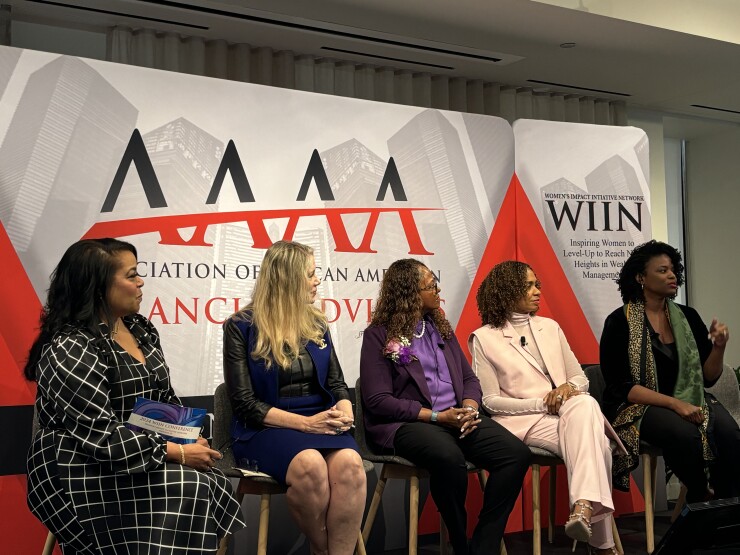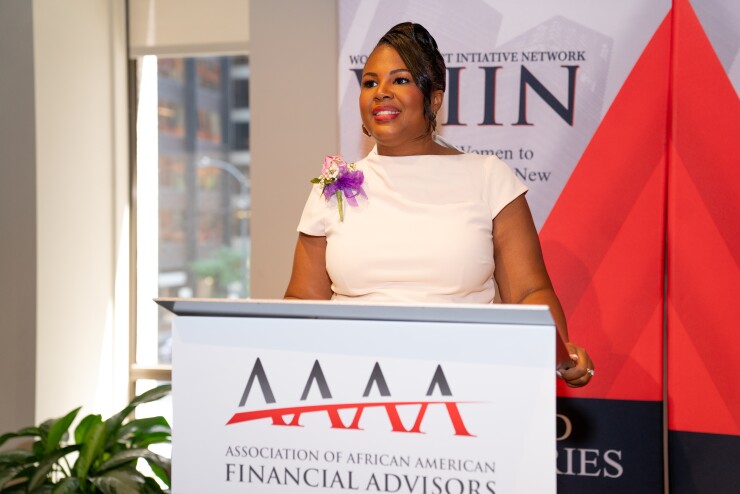Being a financial advisor is being "in the business of changing people's lives," according to Tammia Rowe, the first Black market director for
Rowe made the remark in a panel at this week's
Moderator Clara Sierra, a senior director and industry practice lead for asset management with
Clients who may have been through traumatizing tragedies or divorces are "going to be better when they walk out than how they walked in," Rowe said. "We are in the business of changing lives. It's not just about the numbers. It's, how are you going to make people better?"
READ MORE:
Stark figures drawing industry buy-in
Rowe and
That context added more significance to the event, which was attended by dozens of advisors and other industry professionals, than the standard wealth management conference.
Quad-A's event drew sponsorships from Wells Fargo Advisors, JPMorgan Wealth Management, Merrill, Commonwealth Financial Network, Fidelity Investments, Edward Jones, TIAA, Thrivent, Truist, LPL, Ameriprise, RBC and Baird — companies that supported the creation of a place for Black women advisors "where they can be uniquely who they are and be with people who are just like them," according to Sheena Gray, the interim CEO of Quad-A and a former Chase branch manager and human relations executive with JPMorgan Wealth Management.
"We couldn't do this without you," Gray said in her opening remarks at the conference, noting that the event marked the first of what is planned to be an annual gathering for Quad-A's Women's Impact Initiative Network in her hometown of Chicago. "This is not the end. This is the beginning."
Gray and interim Chairman Alex David, the
In his opening remarks at the conference, David said the event was "a big deal," considering that he didn't "know of one other time" in his three-decade career that the wealth management industry had focused its attention in this manner on Black women in particular.
"This is historic," David said. "All of the major firms have gotten together to collaborate and curate and really applaud and welcome Black women financial advisors and professionals."
READ MORE:
The panelists talked about pivotal moments in their careers. For Nneka Serwaa Constantino, a vice president and senior financial advisor with the St. Paul, Minnesota-based branch of
"It wasn't nice, but it was the not-nice that I needed to hear," Constantino added.
Another crucial turning point came when Constantino, who admitted she felt "very insecure when I started in the business," came up with the idea to target prospective clients who were laid-off executives from local companies. Doing so took convincing herself that "an older white male can see me as an authority in their financial life," she said.
"I felt that I was too young, and I just felt that I was in this very not diverse environment, and I didn't really know how to establish myself as a leader," Constantino said. "They stay with you. They stick with you. They feel like you've been in the trenches with them. It works for the client. It works for me, because I felt that I didn't fit in."

Building for the future
Marie Taylor, a West Hempstead, New York-based financial advisor with
Taylor reminded the clients that, "You're on a plane," that is still being flown by a pilot and that, "You're getting to your destination," she said. The clients remained with her practice.
"Sometimes these are hard discussions to have," Taylor said. "That was a lightbulb moment because I knew I had done my work in explaining it."
READ MORE:
The panelists also spoke about the importance of encouraging women to pursue careers in the profession and aiding those trying to find their path to success. Sometimes, women "are not doing enough to help each other," and "the only way we're going to do it is if we help each other," said Cary Carbonaro, a senior vice president and director of women and wealth services with Ridgewood, New Jersey-based registered investment advisory firm
In an effort to reverse that trend, Carbonaro and other certified financial planners
"You have to see it to be it. Can you see us? You can see us here. Can you see us in the industry? Not that much," Carbonaro said. "I actually talked to hundreds and hundreds, maybe even thousands, of girls who didn't know what a CFP is. … It was really planting seeds for the future."
Rowe described boosting the next generation of professionals as a passion of hers, notingthe importance of "great mentorships that can turn into sponsorships."
A mentor can lend advice that assists their protege in defining their goals and achieving them down the line,
"Find someone that you admire, that you look up to, that you've watched for a while and reach out to them," Rowe said. "A sponsor is going to be that person or persons who's going to be able to say your name in a room that you're not in. And that's powerful."
READ MORE:
The available numbers suggest that a common narrative about women being the
"For Black women that's not happening, and we've been handling the wallet of the Black family since before the civil rights movement," she said. "We have to know the data as financial advisors. Embrace it, but then say, 'What are we going to do about it?'"






